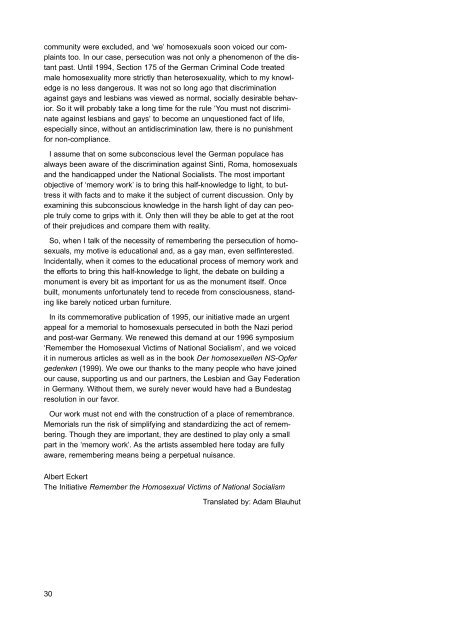Download PDF - Gedenkort für die im Nationalsozialismus ...
Download PDF - Gedenkort für die im Nationalsozialismus ...
Download PDF - Gedenkort für die im Nationalsozialismus ...
Erfolgreiche ePaper selbst erstellen
Machen Sie aus Ihren PDF Publikationen ein blätterbares Flipbook mit unserer einzigartigen Google optimierten e-Paper Software.
community were excluded, and ‘we’ homosexuals soon voiced our complaintstoo. In our case, persecution was not only a phenomenon of the distantpast. Until 1994, Section 175 of the German Cr<strong>im</strong>inal Code treatedmale homosexuality more strictly than heterosexuality, which to my knowledgeis no less dangerous. It was not so long ago that discr<strong>im</strong>inationagainst gays and lesbians was viewed as normal, socially desirable behavior.So it will probably take a long t<strong>im</strong>e for the rule ‘You must not discr<strong>im</strong>inateagainst lesbians and gays‘ to become an unquestioned fact of life,especially since, without an antidiscr<strong>im</strong>ination law, there is no punishmentfor non-compliance.I assume that on some subconscious level the German populace hasalways been aware of the discr<strong>im</strong>ination against Sinti, Roma, homosexualsand the handicapped under the National Socialists. The most <strong>im</strong>portantobjective of ‘memory work’ is to bring this half-knowledge to light, to buttressit with facts and to make it the subject of current discussion. Only byexamining this subconscious knowledge in the harsh light of day can peopletruly come to grips with it. Only then will they be able to get at the rootof their prejudices and compare them with reality.So, when I talk of the necessity of remembering the persecution of homosexuals,my motive is educational and, as a gay man, even selfinterested.Incidentally, when it comes to the educational process of memory work andthe efforts to bring this half-knowledge to light, the debate on building amonument is every bit as <strong>im</strong>portant for us as the monument itself. Oncebuilt, monuments unfortunately tend to recede from consciousness, standinglike barely noticed urban furniture.In its commemorative publication of 1995, our initiative made an urgentappeal for a memorial to homosexuals persecuted in both the Nazi periodand post-war Germany. We renewed this demand at our 1996 symposium‘Remember the Homosexual Vict<strong>im</strong>s of National Socialism’, and we voicedit in numerous articles as well as in the book Der homosexuellen NS-Opfergedenken (1999). We owe our thanks to the many people who have joinedour cause, supporting us and our partners, the Lesbian and Gay Federationin Germany. Without them, we surely never would have had a Bundestagresolution in our favor.Our work must not end with the construction of a place of remembrance.Memorials run the risk of s<strong>im</strong>plifying and standardizing the act of remembering.Though they are <strong>im</strong>portant, they are destined to play only a smallpart in the ‘memory work’. As the artists assembled here today are fullyaware, remembering means being a perpetual nuisance.Albert EckertThe Initiative Remember the Homosexual Vict<strong>im</strong>s of National SocialismTranslated by: Adam Blauhut30


